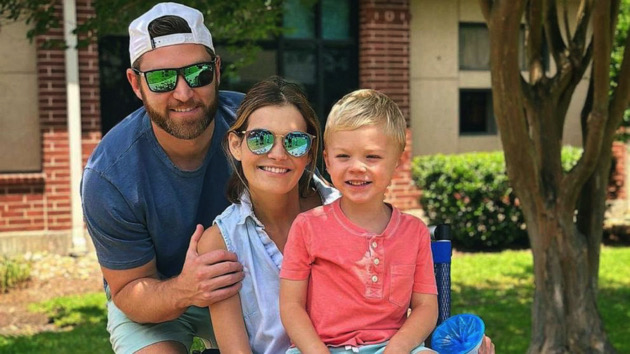(NEW YORK) — The death of a 30-year-old mom who battled ovarian cancer for eight years has put a spotlight on the deadly disease, and its impact on young women.
Haley Odlozil’s death was announced last week on social media by her husband, Taylor Odlozil.
“It is with unbelievable sadness that I tell all of you my sweet Haley has passed away,” he wrote in a post shared on Instagram and TikTok. “I cannot begin to describe the amount of heart ache & grief myself & our entire family is experiencing.”
According to her obituary, Haley Oldozil, a Texas native, passed away on July 14.
He continued, “One thing I can tell you, she suffered greatly fighting this disease that slowly tore her body apart for the last 8 years. The thought of her being completely healed in a body with no pain & no scars in heaven makes me so incredibly happy for her but so overwhelmingly sad Im not there to see it.”
The Odlozils, parents of a 4-year-old son, said previously they shared Haley’s battle with ovarian cancer with their over 2 million followers on social media to raise awareness of the disease, which originates in a woman’s ovaries or in the nearby areas of the fallopian tubes and the peritoneum, the tissue that lines the abdominal wall, according to the U.S. Centers for Disease Control and Prevention.
Ovarian cancer is the second most common gynecologic cancer in the U.S., and it causes more deaths “than any other cancer of the female reproductive system,” according to the CDC.
“Obviously this is not easy to be very vocal and have your whole life, especially your death, splattered across the camera, but all the people who have been impacted by it and who have reached out to us, we really appreciate it,” Haley Oldozil said in a TikTok video from March. “That’s the reason why we’re being so transparent about everything, to bring awareness to ovarian cancer and help people see that please be thankful for each day.”
Haley Oldozil shared previously with her followers that she was diagnosed with advanced stage ovarian cancer in late 2015, shortly before her wedding.
She said the diagnosis came after a long struggle with symptoms including weight gain, fatigue, pain during intercourse and lower back pain, as well as a lump in her abdomen. After visiting multiple doctors and undergoing many tests over the years, Haley Oldozil said that in the fall of 2015, she asked for an ultrasound.
“By the time they did an ultrasound they found a mass in my abdomen and by the time they did a CT scan, I got a call from my gynecologist saying, ‘You have an appointment with an oncologist today. You need to go today,"” she said in a video shared last December on TikTok. “That’s when our whole entire world was shattered. Two months before our wedding. I went in and she said, ‘You have advanced ovarian cancer."”
Ovarian cancer can often be hard to diagnose because there is currently no reliable way to screen for the disease.
While early signs of ovarian cancer can be vague, the main symptoms are abdominal pain or pelvic pain, bloating and an increase in urination, according to Dr. Jennifer Ashton, ABC News chief medical correspondent and a board-certified OB-GYN.
“If these symptoms or others last for more than half the month you want to alert a gynecologist and, again, talk about the fact that it could possibly be ovarian cancer,” Ashton said previously on Good Morning America, after Christiane Amanpour, chief international anchor for CNN, announced her own ovarian cancer diagnosis.
In some cases, targeted use of pelvic scans and sonograms or a CA-125 blood test may be used to detect ovarian cancer, but additional testing is “not one size fits all and it is not recommended for all women,” explained Ashton.
Treatment for ovarian cancer usually involves a combination of surgery and chemotherapy, according to the CDC.
During her eight-year battle with the disease, Haley Oldozil underwent both surgery and chemotherapy, the impacts of which she shared with her followers.
The Oldozils shared on social media that they learned earlier this year that Haley had run out of treatment options.
With a diagnosis in her 20s, Haley Oldozil was part of a small but present minority of women who are diagnosed with ovarian cancer at a younger age.
Around 13% of all cases of ovarian cancer in the U.S. from 2016 to 2020 occurred in women under the age of 45, according to the National Cancer Institute. Just over 4% of cases occurred in women between the ages of 20 to 34.
The most common age of diagnosis for ovarian cancer is between 55 and 64 years of age, according to the institute.
A woman’s risk for developing ovarian cancer at a younger age increases if they have a family history of breast, ovarian, uterine or colorectal cancer, or have a specific genetic mutation like the BRCA1 or BRCA2 genes.
In addition, other risk factors for ovarian cancer include being middle age or older, having a close family member who has had ovarian cancer, having endometriosis, having never given birth and having breast, uterine or colorectal cancer, according to the CDC.
While there is no known way to prevent ovarian cancer, the CDC notes there are things associated with lowering the risk of getting ovarian cancer, including using birth control for five or more years, having given birth, breastfeeding, having had a hysterectomy, having had your ovaries removed and having had a tubal litigation.
Copyright © 2023, ABC Audio. All rights reserved.












